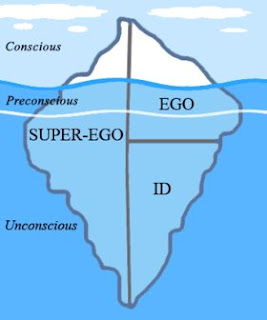
Id: The newborn child is regarded as being completely 'Id-ridden', in the sense that it is a mass of instinctive drives and impulses, and demands immediate satisfaction. This view equates a new born child with an id-ridden individual - often humorously - with this analogy: an alimentary tract with no sense of responsibility at either end!
The id is responsible for our basic drives such as food, sex and aggressive impulses, and demands immediate satisfaction. It is amoral and egocentric' ruled by the pleasure-pain principle; it is without a sense of time; completely illogical; primarily sexual; infantile in its emotional development; will not take 'no' for an answer; is without verbal representation and therefore does not enter consciousness.
Ego: The word ego is taken directly from Latin where it is the nominative of the first person singular personal pronoun and is translated as "I myself" to express emphasis.
In Freud's theory, the ego mediates among the id, the super-ego and the external world. Its task is to find a balance between primitive drives, morals, and reality while satisfying the id and superego. Its main concern is with the individual's safety and allows some of the id's desires to be expressed, but only when consequences of these actions are marginal.
Super-ego: The super-ego tends to stand in opposition to the desires of the id because of their conflicting objectives, and is aggressive towards the ego. The super-ego acts as the conscience, maintaining our sense of morality and the prohibition of taboos.
The Interpretation of Dreams” – Perhaps his most significant writing Freud Believed that whatever our conscious mind was afraid to deal with came to the forefront of our thinking through dreams. He believed dreams are our mind’s way of letting the unconscious come to the surface.
The id is responsible for our basic drives such as food, sex and aggressive impulses, and demands immediate satisfaction. It is amoral and egocentric' ruled by the pleasure-pain principle; it is without a sense of time; completely illogical; primarily sexual; infantile in its emotional development; will not take 'no' for an answer; is without verbal representation and therefore does not enter consciousness.
Ego: The word ego is taken directly from Latin where it is the nominative of the first person singular personal pronoun and is translated as "I myself" to express emphasis.
In Freud's theory, the ego mediates among the id, the super-ego and the external world. Its task is to find a balance between primitive drives, morals, and reality while satisfying the id and superego. Its main concern is with the individual's safety and allows some of the id's desires to be expressed, but only when consequences of these actions are marginal.
Super-ego: The super-ego tends to stand in opposition to the desires of the id because of their conflicting objectives, and is aggressive towards the ego. The super-ego acts as the conscience, maintaining our sense of morality and the prohibition of taboos.
The Interpretation of Dreams” – Perhaps his most significant writing Freud Believed that whatever our conscious mind was afraid to deal with came to the forefront of our thinking through dreams. He believed dreams are our mind’s way of letting the unconscious come to the surface.
Taken from:

1 comment:
Dear Rali,
That was interesting. Keep it.
Hugs,
Parisa
Post a Comment